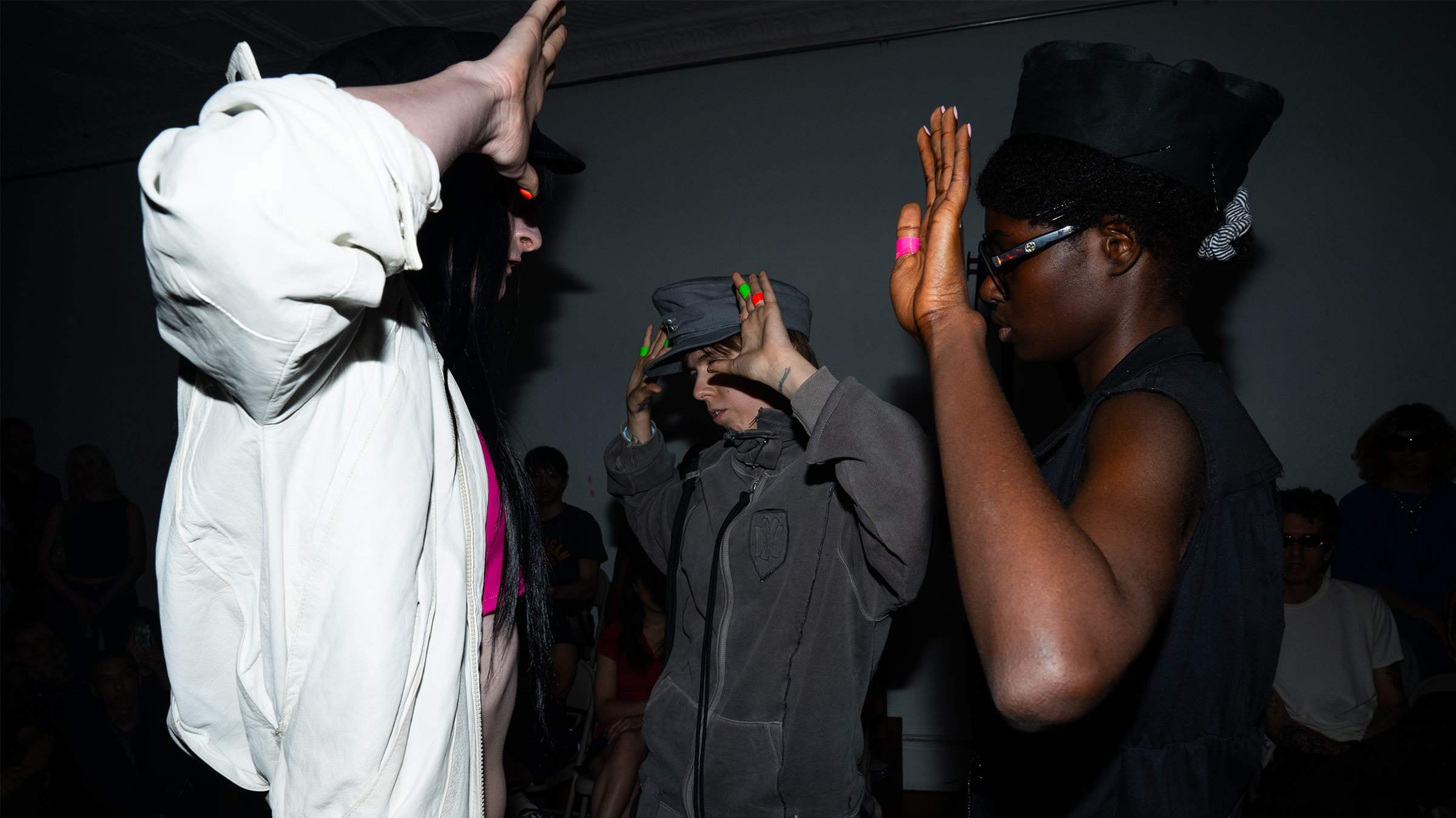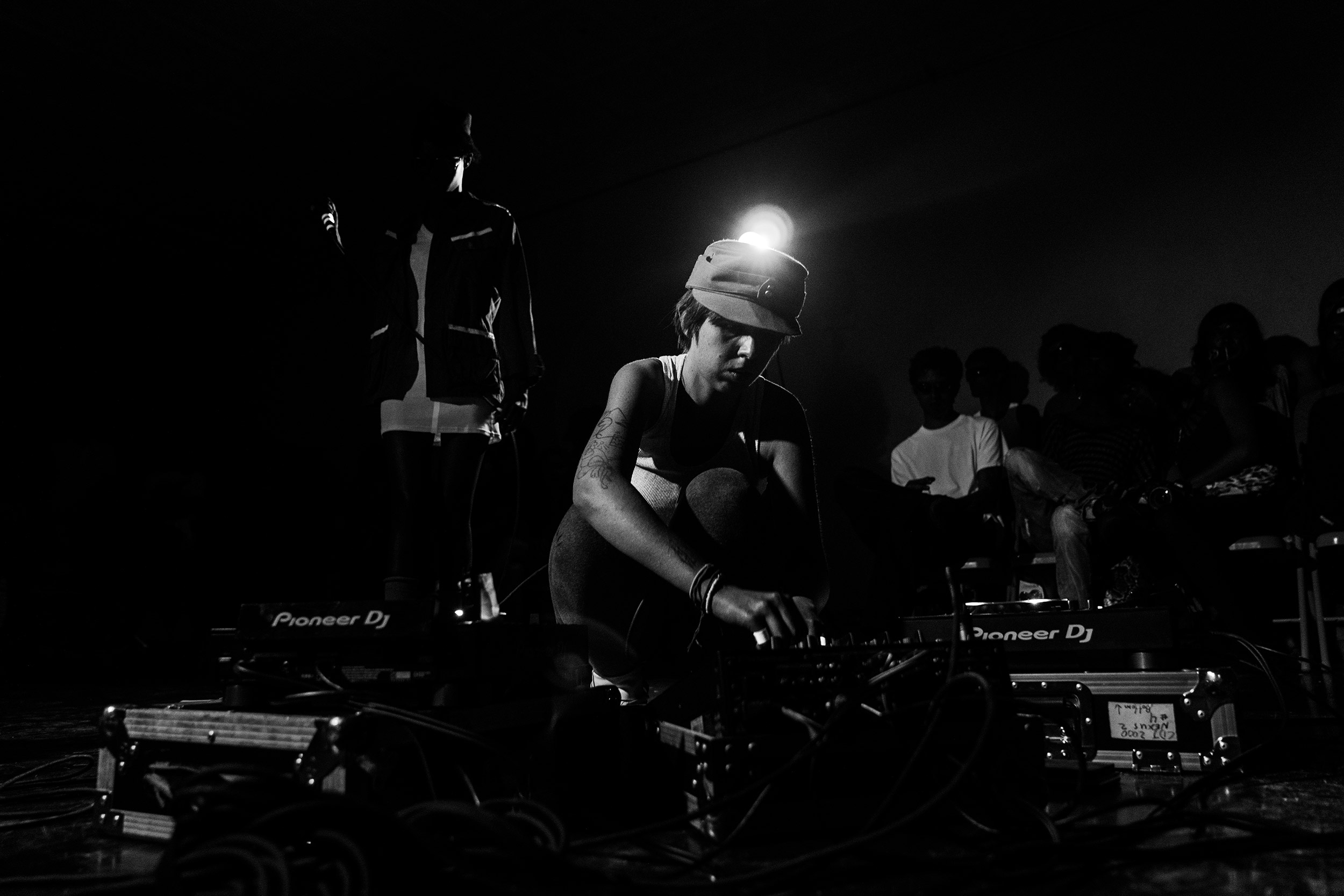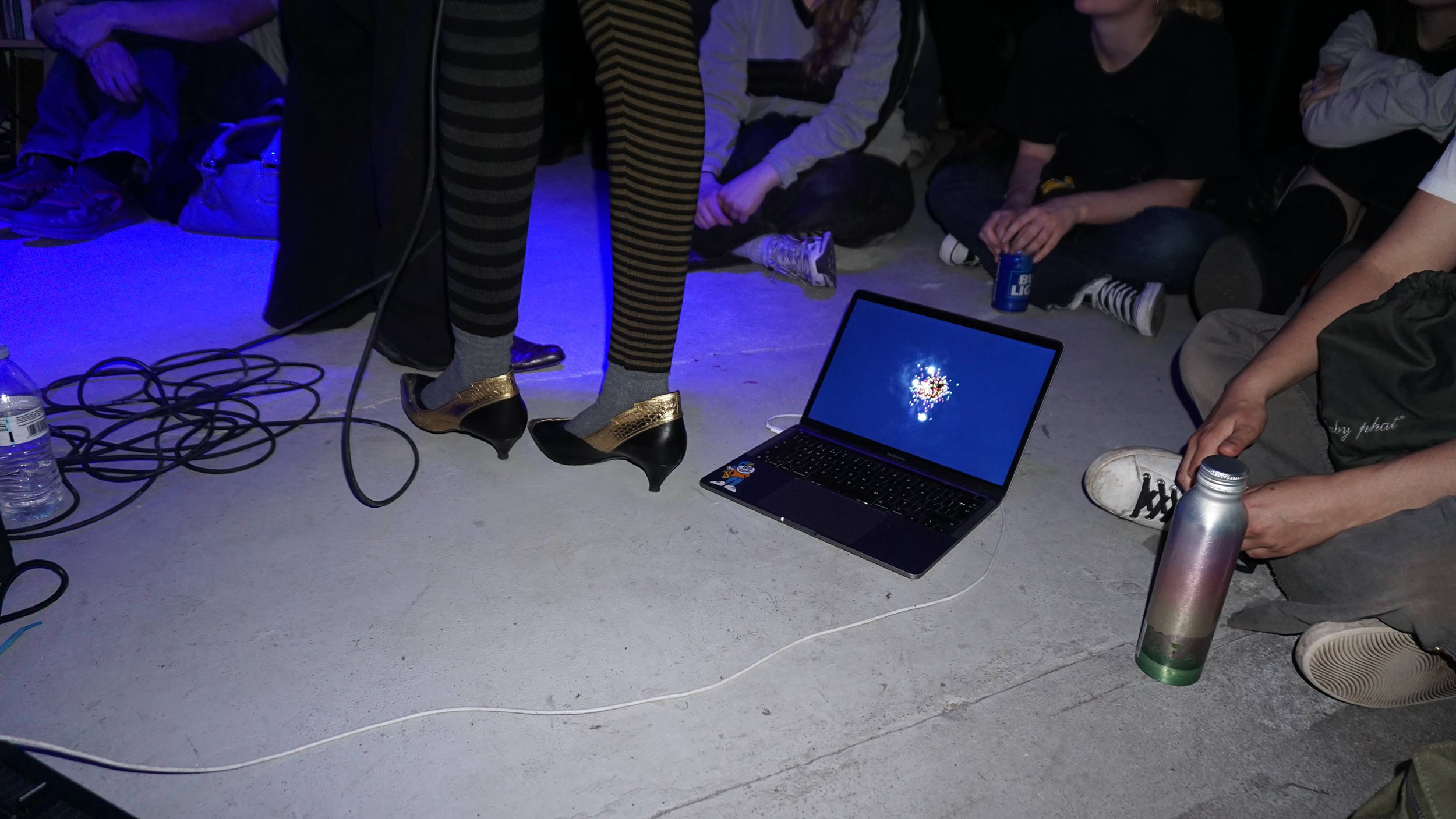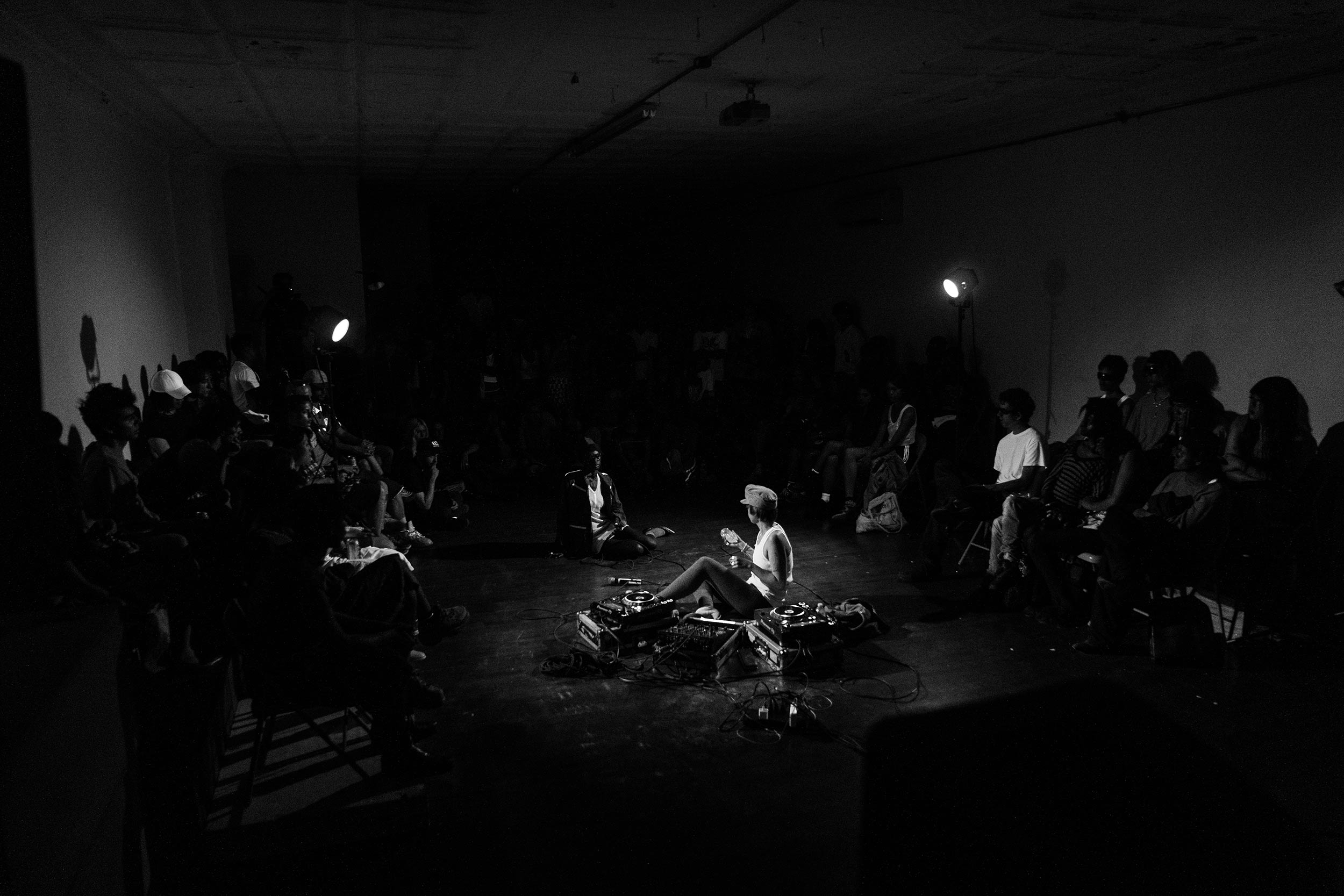Following the release of their sophomore album, Gretchen Lawrence and Coumba Samba reflect on art, friendship, and their lo-fi influences
Fate threw artists Coumba Samba and Gretchen Lawrence together as the roommates (and eventual best friends) who would come to form experimental music duo NEW YORK. For the past two years, the elusive pair has drawn crowds to art galleries and nightclubs alike in their home-base in London, their titular New York, LA (for which a track on their debut album No Sleep Till N.Y is named), and beyond exclusively by word-of-mouth. “It’s been really fun confusing people,” Samba tells me when I ask her about the choice to name the band NEW YORK. “We kind of thought that the project would stay under wraps for a while, just because it’s so hard to find.” Thanks to Samba’s confessional yet detached vocal style and Lawrence’s maximalist production on glitchy synths and innovative beats, NEW YORK’s signature sound serves as an intoxicating soundtrack to contemporary urban life.
Animated by their diaristic yet disaffected candidness, Samba’s lyrics at times recall the cut-up techniques of experimental postmodern literature. They have the power to dream the mechanical fervor of Benny Benassi’s 2002 anthem Satisfaction’s hook “Push me, and then just touch me” into the surreal soundscape of a hot girl’s ultimate lassitude. They coax Ladytron’s words on Seventeen, “They take a Polaroid then let you go, say they’ll let you know,” out of its native danceable electro-synth into something slower—almost meditative—for our overwhelming moment of fluorescent LED subway ads and its nascent generation.
Lawrence’s production masterfully fits the dissonance of an information-overloaded world inside of addictive grooves, listing royalty-free music—the type of thing you might hear during an ad bumper or in the background of a podcast—as spiritual inspiration for the band’s anonymous sound. The music video for No Sleep Till N.Y’s track ‘night n day’ is a montage of poorly-aimed point-and-shoot photos stitched together with presumably an iMovie flare-lense effect, implying a party too good—too IRL—to accurately pose or capture. NEW YORK’S live performances up the ante on their lo-fi vibe, often shunning the stage for a place to sit on the floor, Lawrence with her laptop and synthesizer and Samba with her microphone.
NEW YORK could be called speculative pop, a project with the ability to mix a voicemail or a click-track into a poem, resurrect middle school insults into effortlessly sexy dance tracks (“call me you slore, call me your slut whore,” requests the probable club hit ‘L.A.’), and plug retro-futuristic ringtones into what sounds like a dub beat. In this vein, their new album, rapstar*, is a speculative mixtape—a concept album with an A side and a B side, inviting No Bra, Ren G., their stylist Lulu Bullock, LC, and Lolina to fill out the girls’ vision. rapstar* is a sophomore album worth the hype—and then some.
As NEW YORK returned from playing a show in Japan, the band sat down with Document to reflect.
Zoey Greenwald: I know that you both have backgrounds as installation artists, I wanted to ask if each of you view NEW YORK as a performance project, or even an installation project? How does it fit in with your visual art practices?
Coumba: I think when we started it, it was supposed to be a pop music performance.
Gretchen: When we started doing the project, we wanted to use it as a playground. We don’t view it in a very conceptual way, but we like to think about what we put out into the world. A lot of the music and a lot of the stories being told in music right now do not reflect where we come from. I guess music is the easiest way to talk about these things. I don’t think there’s any other platform that can create such a physical feeling, or can, you know, reach euphoria. So music is where we can actually talk about emotions, and it’s not as serious; it’s the least serious of all the things.
Zoey: I’m interested in what you said about how what’s going on in music right now doesn’t necessarily reflect where you both come from. And I was wondering if you could elaborate on that?
Gretchen: I’m from Eastern Europe, so being in London, like, I had never ordered anything from eBay, or Amazon, or shit like that. That’s the smallest example, but in this capitalist world that we live in, you grow up as an Eastern European, and you’re kind of drooling over all of it. Growing up watching MTV, I grew up with an understanding of pop music that is completely different than what it actually is. Things seemed glamorous then, it seemed like I could never reach those things. Eastern Europe in the ’90s and early 2000s was quite separated and had its own thing going on. But everyone kind of grows up dreaming about going to the west, I guess.
Coumba: I was born in Harlem, and then I went to Senegal for five years, and then came back to New York in 2009. Because I got back to New York in 2009, I only discovered everything in 2009. In my head, everything is from 2009.
Zoey: Do you think feeling the 2009-ness of things affects the work you’re doing with NEW YORK?
Coumba: I think so. We also do stuff or try to reference things outside of that. But in terms of aesthetics, our band image is very 2009 I would say.
Gretchen: It’s kind of by accident. It’s not even about the music that was happening in 2009 itself but it’s about growing up in a city or a place and that music being in the background.
Zoey: I was thinking about this listening to rapstar* because of the vocal sample that just goes “chair plus couch equals chill lounge party.” I wanted to ask about your relationship to space, especially during the live performances. Did it change from No Sleep Till N.Y. through to rapstar*?
Coumba: I think it started from knowing that we didn’t want to perform on stages and to have that weird hierarchy between us and the crowd. Gretchen had also been performing before and it was kind of the same vibe, performing in the crowd. I think it helps us connect more and be more in the moment.
Gretchen: We didn’t have choreo for a long time. Organically, some tracks grew into having choreo, and then we were like, This is amazing. When we put out No Sleep, we had only done, like, two gigs. But it was a bedroom album, so we just had a laptop on the floor when we didn’t know what to do. Because we’re quite shy, I guess. So we liked being on the ground and having this setting that everyone’s familiar with. The performance isn’t meant to be super interesting, not every second of it has to be super entertaining. We’re kind of just chilling.
Coumba: I think being on the floor is also nice in terms of crowd movement. The people who know that we perform choreography will come to the front, or know what to expect. And the people who just want to chill can just chill and enjoy the music. It’s not too much of a thing.
Gretchen: Both of us were clubbing when we were younger, so it’s kind of a familiar setting. We mostly perform in clubs and music venues. The people running the venues, they’re always confused. Like, ‘Are you sure? Your laptop is just gonna be on the floor?’ Doing that, I slowly realized that people just don’t rethink how a venue or a club should be, but everything is there. You just have to turn the lights a little bit.
We’ve always viewed rapstar* as a concept album, so we wanted the experience to be specific. We choreographed it more, we stopped doing the laptop thing. Before, we would just have an iTunes playlist playing, but now we’re trying to incorporate more like live stuff, because the music is not as dancey. So we have to find something else to do. Which is fun, which happens to be like live vocal glitching, so now we’re kind of like focusing on that.
Zoey: What do you think motivated that change?
Coumba: I think, as we were working on it, it kind of became more serious. I feel like it ended up darker than we thought it would. We were also making it in a time where we were just kind of down, and there was— I mean, there’s still so much happening in the world. It kind of translated into our performance outfits being more military inspired, and also getting rid of the fun laptop vibes.
Gretchen: It’s a thing of the past, but it’s a throwback to when with every album, the pop artist completely changed their sound. [rapstar*] is a different perspective on how cities operate, how those structures work. So much shit was happening when we were writing it. Growing older, it’s impossible to be as naive, and with the constant overflow of information, it’s very difficult not to be affected. But the musical style being more intense, the lyrics are what bring more light into it. So if it’s serious, it’s still playful.
Zoey: About the rap or hip hop influence on this album: Aside from it being separated into an A side and a B side, there is also a large amount of features and collaborations on this record. What did it feel like to put that together? And work with people in a more communal way?
Coumba: With everything that we do in the band, we work closely with people we already know; our friends. When we made rapstar*, it started with one of our best friends just being like, ‘Oh, I made this recording.’ And then we ended up making it into a song. As we were working more on the album, we were just like, ‘We should have this friend join, we should have that person join.’ I think it was also important for us to have all the girlbosses in there.
Gretchen: Especially the ultimate girlboss, Lolina. Lulu [Bullock] styles us for our press pictures, and we were like, ’we can have a song together. We can perform it together.’ It was her first time making music. The same thing happened on No Sleep: the track ‘L.A.’ has our friend Mina on it, and that’s also her debut. We just have a lot of these amazing people. They’re just great people, and it’s super fun. With friends, they’re all super down for everything. No Bra having a feature is kind of iconic, because I found her music when I was 16 or 17, and I was like, This is crazy. So then we met in New York through a mutual friend, and it’s been great because in the process, we’ve become friends.
Zoey: I wanted to ask what role friendship has played in your process. How did you and Coumba become friends?
Gretchen: Coumba moved into the flat I was living in, and she was playing some crazy music when she was hanging out in the living room. The first track we made, Coumba sent me two voice recordings. One was singing Taylor Swift, and the other one was singing Chief Keef, and then, I put them together and made this beat. And that’s actually the beat from the song with No Bra. So that’s actually the first track that we made together.
Coumba: And over time, we were just like, ‘Let’s start a band.’ We’re best friends anyways. And then this was just, like, fun.
Gretchen: It is fun. We’re taking it seriously, but we’re not taking anything too seriously.













